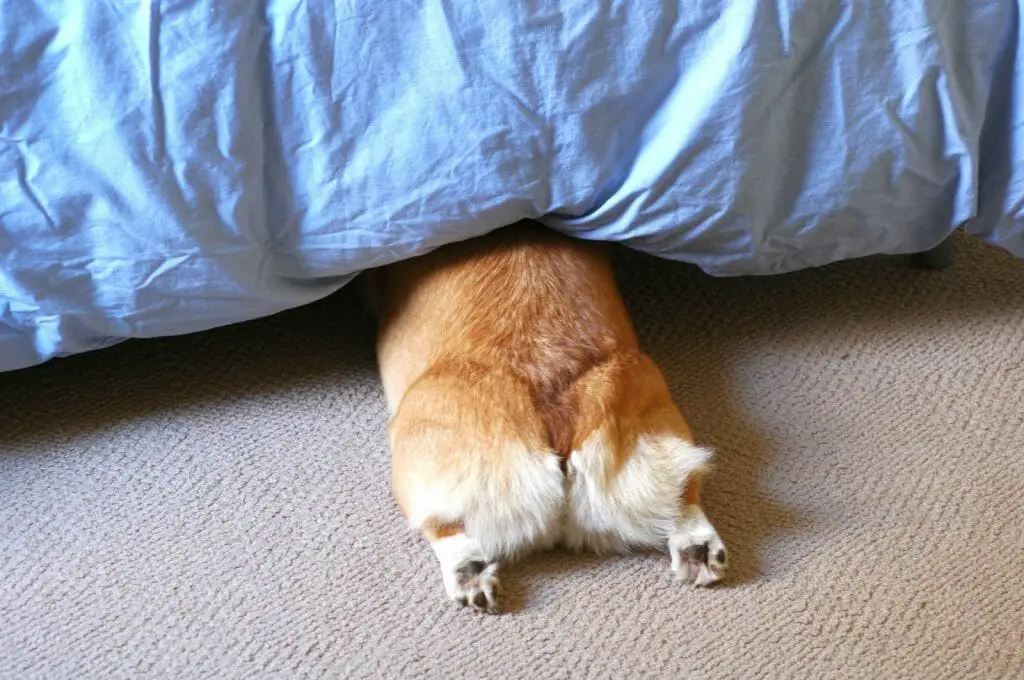Table of Contents
Is your dog a fart machine? It may seem funny at first, but gas can be problematic for canines. Regardless if it’s silent but deadly or loud but harmless, you have to do something about it. Excessive dog farts mean that something is going on in your doggo’s tummy. And aside from the gross smell, gas is also uncomfortable for your pooch. So what do you give a dog for gas? In this post, we will guide you through the cause of farts and what you can do to stop it.
Why is my dog farting so much?

Your dog’s gassiness can be due to a lot of reasons. Meals are the usual culprits, but it can also be your dog’s activities or the lack thereof.
Intestinal gas is formed as the by-product of hydrogen sulfide during digestion. Since it’s trapped in the colon, the only way to release it is through farting.
Also, dogs can swallow air while they eat. Some of the most notorious farters are Pugs, Bulldogs, Frenchies, and Boston Terriers. These brachycephalic and deep-chested canines are more likely to swallow more air.
Nevertheless, it’s normal for dogs to fart once in a while. Like humans, they can get gassy on some days. However, if your dog’s booty sounds off every day with a foul smell, you must do something about it. Also, excessive gas can be life-threatening if it leads to gastric torsion.
Reasons for dog farts
There are four main causes of dog farts, though other things can also lead to the smelly problem. Here are some of the things you should watch out for.
-Their diet
Your dog’s diet is the leading cause of its gassiness. Food with soybeans, beans, dairy, and too much fat can induce excessive gas. Take note that dogs and cats are lactose intolerant. If they ingest dairy, which is a source of lactose, they will experience gassiness as well as vomiting and diarrhea. You should also watch out for your dog’s sensitivity to various grains.
Also, if you’re giving your dog low-quality food, don’t be surprised if they will fart non-stop. Dog food packed with artificial ingredients and fillers will cause excessive fermentation on your dog’s tummy. This, in turn, will produce a lot of gas on the colon.
Take note that spicy food will also cause farting. And the more difficult it is to digest your dog’s food, the gassier the pooch becomes.
Another thing: stop giving your dog table scraps. Human food is one of the leading causes of digestive problems among canines. Aside from being high in sugar, it’s also rich in fat.
Moreover, gassing can happen if you changed your dog’s diet recently. As the stomach of your dog adjusts to the new food, the process could be mired with gas. Still, this problem should stop after a week or two. If it hasn’t, it might be better to switch your dog back to its old diet or consider calling the vet.
-Scavenging
For dogs who love dumpster diving, farting would be inevitable. The trash is filled with nasty things: spoiled food, human food, toxic substances, and whatnots. If your dog ingests any of these substances, it would cause fermentation in their tummies. You’re lucky if your dog only produces smelly farts. Some would experience poisoning too.
Don’t let your dog explore the trash for some nasty treats. Covered your bin properly and teach your dog the “Leave it!” command. That way, you can prevent the gaseous problem from happening.
Take note that you should also watch out if you’re walking your dog or bringing them to dog parks. Make sure that the trash bins are covered.
-Swallowing air
Canines that eat like grinding machines are guaranteed to be gaseous. As they gobble into the food bowl, they also swallow large amounts of air. Again, this is most evident among deep-chested and flat-nosed canines.
The good thing about this gas is that it has less smell than those produced in the stomach. Still, you shouldn’t dismiss this problem. Swallowing too much air can lead to indigestion and the dreaded gastric torsion.
Gastric torsion happens when your dog consumes too much food, water, and air at the same time. This inflates their tummies like a balloon. This will cause difficulty in breathing. And if not addressed right away, gastric torsion can be deadly in a matter of waters.
In fact, vets will poke a hole in the stomach of dogs with severe cases of gastric torsion. This is to release the excess air trapped in their tummies.
-GI tract and colon problem
If the food of your dog isn’t the problem, you must bring the pooch to the vet to have its GI tract checked. Some dogs tend to have gas accumulated within their gastrointestinal tract.
Also, the vet will check for any underlying illness on your dog that’s causing flatulence.
Should I be worried about excessive gas?
If your dog just farts mildly once a day, there shouldn’t be any reason for panic. However, if excessive gas is accompanied by diarrhea, vomiting, nausea, and noticeable stomach distension, you must call the vet.
The problem with excessive gas is it can become fatal for deep-chested canines. Once the gas and food accumulate inside, it would push other internal organs. If not treated right away, this can lead to organ failure and the apparent death of the canine.
What do you give a dog for gas?

If you’re starting to worry about the flatulence of your dog, you must do something to reduce the gassy situation. So what do you give a dog for gas? Here are some of our recommendations based on our experience as a pet owner:
-Some digestive aids
Digestive aids or enzymes assist in the digestion of your pooch. This way, you doggo can break down food in its stomach easily and prevent excessive production of gas. These products are available in individual packets with various enzymes and starches that also improve the absorption of nutrients.
If you’re going to purchasing a digestive enzyme, you should check what time you’re getting. This product is available in three types: protease for digesting protein, amylase for digesting carbs, and lipase for digesting fats.
You must choose the right type based on the food that your doggo just ingested. This will guarantee the efficacy of digestive aid.
-New food
You can also consider switching your dog to a new diet. Your pooch’s current meal may have too much corn, soy, and other gas-inducing grains. Also, it’s time to invest in high-quality with high digestibility.
If your doggo is currently on a premium diet and still gassy, look for another with a more digestible protein. Eggs are the most digestible protein source followed by a fish meal, chicken, and lamb. Usually, beef and other stiffer meats take more time to digest. And if your pooch has a sensitive tummy, these hard-to-digest proteins will cause gas.
Also, avoid any fart-inducing food like Brussels sprout, cauliflower, broccoli, and other cruciferous vegetables. Still, a small serving of these veggies is fine but watch out for your dog’s farts.
-Some herbs
A few herbs can also help in reducing the gassiness of your doggo. One of which is fennel. Just sprinkle chopped fennel, fresh or dried, on your dog’s food. If your pooch evades the leafy green, we recommend adding some water into the kibble so the fennel would stick to it.
Another good herb for gassy dogs is parsley. Although it doesn’t reduce flatulence, it can drastically improve the smell of your dog’s fart. Parsley is known to reduce odor in the digestive tract as well as easing halitosis.
You can also give your dog a few drops of edible peppermint oil. Always dilute this oil to prevent irritation. Also, ginger helps reduce the flatulence of a dog.
-Daily probiotic
Probiotics play a very integral role in the digestive system, not just of dogs but also of humans. You can find probiotic treats that make it easy to add this nutrient to your dog’s diet. These good bacteria help maintain balanced intestinal flora.
Take note that probiotics are different from prebiotics. Prebiotics are non-digestible fibers on food. These fibers go through the small intestine to the large intestine of the canine where it gets fermented. And when fermentation occurs, gas is produced. This is what we want to avoid.
Sure, prebiotics is still needed, but don’t be an overbearing pet owner who will give too much. This applies to both prebiotics and probiotics.
-More exercise
If you have a couch potato dog that farts nastily, it’s time to give it some exercise. Exercise is known to boost digestion and reduce farting. A sedentary lifestyle only worsens the condition of your pooch.
Give your doggo enough playtime, walk it around the neighborhood, and visit dog parks. This is also a good way to put your dog’s energy to good use.
If you’re busy and can’t walk your dog regularly, you can hire a dog walker to ensure that your pooch gets enough physical activity.
More ways to reduce your dog’s gassiness
Aside from these things that you can give your dog, here are more ways on how you can reduce their gassiness:
-Slow down their eating
Slow that eating machine down! Put the brakes on your dog’s gobbling habit by using a special bowl. Some dog bowls have obstacles or angles that hinder your dog’s continuous chewing. This will slow them down while reducing their ingestion of air.
If you don’t want to spend more money on food bowls, just use a typical steel bowl. Turn it upside down and place the kibble around its raised rim.
-No people food, please
No matter how much your dog begs, don’t give it table scraps. Like what we mentioned earlier, human food isn’t made for dogs. You must inform everyone at home about this so they won’t give any unscheduled treat to the pooch.
It’s also a great way for your dog to respect the table while everyone is eating. Besides, human food gives dogs smelly farts. Not giving them any scrap is for the benefit of the dog as well as your nose.
-Consult a vet
If the farts don’t seem to stop whatever you do, it’s best to schedule a meeting with the vet. Your dog will be examined to determine what’s causing excessive flatulence. It can be a health problem or that you’re missing something on the pooch’s diet.
Also, the veterinarian can suggest new food to reduce the gassiness of your dog. Bloodwork isn’t usually needed, but the vet may decide to do so just to be sure.
Frequently Asked Questions
Q: My dog becomes gassy all of a sudden?
A: If your dog starts making loud and smelly farts out of nowhere, it can be a health problem. Some possible causes include liver issues, pancreatitis, and intolerance. All of which can only be confirmed through proper vet examination.
Q: Do worms cause gassiness in dogs?
A: Yes, puppies with worms may experience excessive gassiness as one of the symptoms of the infestation. This will also give your puppy a distended belly, which will grow larger as the infestation advances.
Q: Will eating grass cure my dog’s gassiness?
A: No. Dogs graze because of a variety of reasons and stomach irritation is just one of them. However, the gassiness won’t be cured by letting your dog consume grass. Worse, the canine may get poisoned if the grass is treated with toxic fertilizer.
Final words
So what do you give a dog for gas? In this post, we discussed the reasons behind the gassy problem and what you can do about it. Never shy away from the advice of a veterinarian. Also, never ignore your dog’s flatulence as it can lead to other health problems.
Do you have more suggestions on how to reduce gassiness in dogs? Share your thoughts with us in the comment section!
